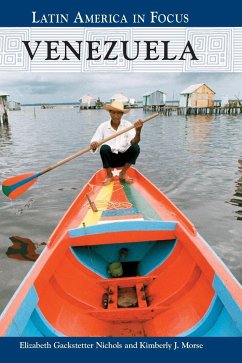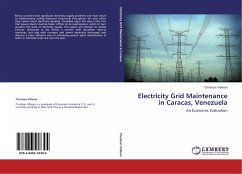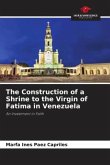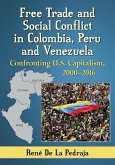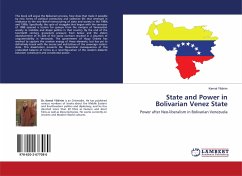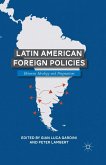- Gebundenes Buch
- Merkliste
- Auf die Merkliste
- Bewerten Bewerten
- Teilen
- Produkt teilen
- Produkterinnerung
- Produkterinnerung
This comprehensive overview of Venezuelan history, culture, and politics is designed to ground the high school student's knowledge of the crucial role of the nation on the international scene. Venezuela stands out as one of Latin America's most influential, yet controversial countries, leading students to want to know more about the nation and its outspoken president. Taking an interdisciplinary approach to ground an understanding of the contemporary nation, Venezuela provides the reader with an overview of the Venezuelan story from 1499 to the present. The study provides a comprehensive look…mehr
Andere Kunden interessierten sich auch für
![Electricity Grid Maintenance in Caracas, Venezuela Electricity Grid Maintenance in Caracas, Venezuela]() Christian VillaranElectricity Grid Maintenance in Caracas, Venezuela38,99 €
Christian VillaranElectricity Grid Maintenance in Caracas, Venezuela38,99 €![Juvencio Pulgar Juvencio Pulgar]() Francis Marrero De GonzálezJuvencio Pulgar26,99 €
Francis Marrero De GonzálezJuvencio Pulgar26,99 €![The Construction of a Shrine to the Virgin of Fatima in Venezuela The Construction of a Shrine to the Virgin of Fatima in Venezuela]() M. Inésde la Santa Cruz Paez CaprilesThe Construction of a Shrine to the Virgin of Fatima in Venezuela45,99 €
M. Inésde la Santa Cruz Paez CaprilesThe Construction of a Shrine to the Virgin of Fatima in Venezuela45,99 €![Free Trade and Social Conflict in Colombia, Peru and Venezuela Free Trade and Social Conflict in Colombia, Peru and Venezuela]() René de La PedrajaFree Trade and Social Conflict in Colombia, Peru and Venezuela55,99 €
René de La PedrajaFree Trade and Social Conflict in Colombia, Peru and Venezuela55,99 €![Beauty, Virtue, Power, and Success in Venezuela 1850-2015 Beauty, Virtue, Power, and Success in Venezuela 1850-2015]() Elizabeth Gackstetter NicholsBeauty, Virtue, Power, and Success in Venezuela 1850-2015108,99 €
Elizabeth Gackstetter NicholsBeauty, Virtue, Power, and Success in Venezuela 1850-2015108,99 €![State and Power in Bolivarian Venez State State and Power in Bolivarian Venez State]() Kemal YildirimState and Power in Bolivarian Venez State26,99 €
Kemal YildirimState and Power in Bolivarian Venez State26,99 €![Latin American Foreign Policies Latin American Foreign Policies]() Peter LambertLatin American Foreign Policies53,99 €
Peter LambertLatin American Foreign Policies53,99 €-
-
-
This comprehensive overview of Venezuelan history, culture, and politics is designed to ground the high school student's knowledge of the crucial role of the nation on the international scene. Venezuela stands out as one of Latin America's most influential, yet controversial countries, leading students to want to know more about the nation and its outspoken president. Taking an interdisciplinary approach to ground an understanding of the contemporary nation, Venezuela provides the reader with an overview of the Venezuelan story from 1499 to the present. The study provides a comprehensive look at all aspects of life in this South American powerhouse, discussing the nation's geography, history, government and politics, economy, society, and culture. Specific attention is directed to topics such as industry, labor, religion, ethnicity, women, etiquette, literature, art, music, and food, among many others. In addition, the book examines the controversy surrounding Venezuelan leader Hugo Chávez. Written in an accessible and engaging tone, this volume is ideal for high school and undergraduate students-and essential for library shelves.
Produktdetails
- Produktdetails
- Verlag: ABC-CLIO
- Seitenzahl: 476
- Erscheinungstermin: 14. Oktober 2010
- Englisch
- Abmessung: 260mm x 183mm x 30mm
- Gewicht: 1083g
- ISBN-13: 9781598845693
- ISBN-10: 1598845691
- Artikelnr.: 29949461
- Herstellerkennzeichnung
- Libri GmbH
- Europaallee 1
- 36244 Bad Hersfeld
- gpsr@libri.de
- Verlag: ABC-CLIO
- Seitenzahl: 476
- Erscheinungstermin: 14. Oktober 2010
- Englisch
- Abmessung: 260mm x 183mm x 30mm
- Gewicht: 1083g
- ISBN-13: 9781598845693
- ISBN-10: 1598845691
- Artikelnr.: 29949461
- Herstellerkennzeichnung
- Libri GmbH
- Europaallee 1
- 36244 Bad Hersfeld
- gpsr@libri.de
Elizabeth Gackstetter Nichols is professor of Spanish and chair of the Department of Languages at Drury University, Springfield, MO. Kimberly J. Morse is associate professor of history at Washburn University, Topekas, KS.
About the Authors
Preface
1 Geography
Death in El Dorado
Geographic Overview
The Maracaibo Lowlands: Fountain of Black Gold
The Mountains of the West and North: From Andes Towns to Capital City
Beaches
Oil
and Coffee!
Following the Orinoco River to the Guiana Highlands: The Lost World
The Orinoco Plains
Amazonas and the Far South
2 HISTORY
Timeline
Colonial Beginnings
The Established Colony and Colonial Institutions
Independence
The Long 19th Century
Mi Benemérito Juan Vicente Gómez
Oil
Gómez Is Dead: Now What?
The Trienio (1945-1948)
Marcos Pérez Jiménez
Punto Fijo
The Good
the Bad
and the Ugly of Partidocracia
The Very Ugly 1980s
3 GOVERNMENT AND POLITICS
Branches of Government and Governmental Structure
Federal and State Structure
Political Parties
Electoral System
Constitution
An Overview of Formative Events in Recent Venezuelan Politics
The End of Puntofijismo and the Economic Crisis
The First Military Coup Attempts
1998 Presidential Elections
New President
New Constitution
Megaelections
New Policies
New Projects
The 48-Hour Coup or the Chamber of Commerce Coup
The Recall
The Lesson of Social Polarization
The "People's President" and Civil Society
Chávez and Bolivarian Revolution: Successes and Failures-Trying to Occupy the Barren Middle Ground
Democracy and the Democratic Process
Poverty and State Spending on the Poor
4 ECONOMY
Overview
A Note on the Informal Economy
Industry
Neoliberalism
Labor
Economics and Politics in the Chávez Era
Trade and Finance
Land Reform
Conclusion
5 SOCIETY
Introduction
Religion and Thought
Religion and Religiosity
The Catholic Church in the Colonial Era
Church
State
and Society in the 19th and 20th Century
Popular Religion and Religiosity
María Lionza
Protestantism in Venezuela
Practical Religiosity
Social Classes and Ethnicity
Who Is Venezuelan?: Race and Class in Venezuela
Indigenous Venezuelans in the Colonial Era
Slave and Free
African and Mixed Race in Colonial Venezuela
White Venezuelans in the Colonial Era
Living Together in the Colonial Era
Establishing the Rules about Coexistence and Interaction after Independence
Indigenous Venezuelans in the 19th Century
Blurring the Line between Race and Class
Women and Marriage
Oppression and Adoration: Women in Education
Politics
and Beauty Pageants
Public versus Private: Social and Historical Context
Current Political and Social Status
Education and Income
Marriage and Health
Politics
The Dividing Line of Social Class
The Goddess and the Queen
Oppression and Adoration: The Paradox
The Revolutionary Gay Movement: Seeking a Place for LGBT Rights in 21st-Century Venezuela
Education
Education: A Path to Modernization and Equality
Historical Background
Contemporary Overview
Exemplary Public Higher Education: The Universidad Central de Venezuela
Changes to the Educational System
Controversy and Opposition to Educational Changes
Conclusions
6 CULTURE
Introduction
Language
Preliminary Expansion and Domination of Castilian
Andrés Bello Cleans Up the Language
Modern Spanish in Venezuela: Would Bello Be Proud?
Indigenous Languages in Venezuela: Language Domination and Survival
Other Indigenous Languages
The Importance of English
Case Study: Little Venice
Etiquette
Respect and the Family
Etiquette and Growing Up
Etiquette
Family
and the Daily Rhythms of Life
Etiquette
Family
and Dating
Clothing
Parties and Other Gatherings
Formal or Otherwise
Time and Traffic
Etiquette and Language for Professionals
Literature
Andrés Bello: Writer
Philosopher
Jurist
Educator
All-Around Intellectual Hero
The 19th Century and Intellectual Autonomy
Women Writing the 20th Century and Beyond
Working Together: Literary Groups
Public Poetry and the Writer-Statesman
Art
Mysterious Rock Art
Armando Reverón Remakes the Venezuelan Landscape
Alejandro Otero and the Geometric Revolution
Soto and Cruz-Diez: Making Art Move
Gego and the Reticulated Image
Marisol: Pop Art with a Message
Javier Téllez: Video Passports to Other Spaces
Monuments to National Art and National Pride
Popular Art in 21st-Century Caracas
Music
Teresa Carreño: Classical Heroine
Classical Music in Contemporary Venezuela: Creating Opportunity
Popular Music: The National Sound
The Voice of the People: Community Radio and Contemporary Rap Music
Food
Corn and Rice
Fruits and Vegetables
Meat and Seafood
Beverages
Agricultural Production and Price Controls
Sports and Leisure
Baseball: The National Sport
Soccer
Other Sports
Leisure Activities
Festivals: Tradition and Modernity Combine
Popular Culture
The Most Popular of Culture: The Telenovela
Other Programs and Issues in the World of Venezuelan Television
Film
Pageantry and the Price of Beauty
Architecture
Vernacular Architecture
Colonial Architecture
The Advent of Professional Architecture
Misión Habitat: 21st-Century Approaches to Public Housing
7 CONTEMPORARY ISSUES
Internal Issues: Instability
Insecurity
and Human Rights
Political Instability
Corruption
Freedom of the Press and Freedom of Assembly
Electricity and Water Problems
Foreign Relations: Chasing Bolívar's Dream
Venezuela-Colombia Relations
Venezuela and the United States
Conclusions
Glossary
Facts and Figures
Major Venezuelan Holidays and Festivals
Country-Related Organizations
Annotated Bibliography
Thematic Index
Index
Preface
1 Geography
Death in El Dorado
Geographic Overview
The Maracaibo Lowlands: Fountain of Black Gold
The Mountains of the West and North: From Andes Towns to Capital City
Beaches
Oil
and Coffee!
Following the Orinoco River to the Guiana Highlands: The Lost World
The Orinoco Plains
Amazonas and the Far South
2 HISTORY
Timeline
Colonial Beginnings
The Established Colony and Colonial Institutions
Independence
The Long 19th Century
Mi Benemérito Juan Vicente Gómez
Oil
Gómez Is Dead: Now What?
The Trienio (1945-1948)
Marcos Pérez Jiménez
Punto Fijo
The Good
the Bad
and the Ugly of Partidocracia
The Very Ugly 1980s
3 GOVERNMENT AND POLITICS
Branches of Government and Governmental Structure
Federal and State Structure
Political Parties
Electoral System
Constitution
An Overview of Formative Events in Recent Venezuelan Politics
The End of Puntofijismo and the Economic Crisis
The First Military Coup Attempts
1998 Presidential Elections
New President
New Constitution
Megaelections
New Policies
New Projects
The 48-Hour Coup or the Chamber of Commerce Coup
The Recall
The Lesson of Social Polarization
The "People's President" and Civil Society
Chávez and Bolivarian Revolution: Successes and Failures-Trying to Occupy the Barren Middle Ground
Democracy and the Democratic Process
Poverty and State Spending on the Poor
4 ECONOMY
Overview
A Note on the Informal Economy
Industry
Neoliberalism
Labor
Economics and Politics in the Chávez Era
Trade and Finance
Land Reform
Conclusion
5 SOCIETY
Introduction
Religion and Thought
Religion and Religiosity
The Catholic Church in the Colonial Era
Church
State
and Society in the 19th and 20th Century
Popular Religion and Religiosity
María Lionza
Protestantism in Venezuela
Practical Religiosity
Social Classes and Ethnicity
Who Is Venezuelan?: Race and Class in Venezuela
Indigenous Venezuelans in the Colonial Era
Slave and Free
African and Mixed Race in Colonial Venezuela
White Venezuelans in the Colonial Era
Living Together in the Colonial Era
Establishing the Rules about Coexistence and Interaction after Independence
Indigenous Venezuelans in the 19th Century
Blurring the Line between Race and Class
Women and Marriage
Oppression and Adoration: Women in Education
Politics
and Beauty Pageants
Public versus Private: Social and Historical Context
Current Political and Social Status
Education and Income
Marriage and Health
Politics
The Dividing Line of Social Class
The Goddess and the Queen
Oppression and Adoration: The Paradox
The Revolutionary Gay Movement: Seeking a Place for LGBT Rights in 21st-Century Venezuela
Education
Education: A Path to Modernization and Equality
Historical Background
Contemporary Overview
Exemplary Public Higher Education: The Universidad Central de Venezuela
Changes to the Educational System
Controversy and Opposition to Educational Changes
Conclusions
6 CULTURE
Introduction
Language
Preliminary Expansion and Domination of Castilian
Andrés Bello Cleans Up the Language
Modern Spanish in Venezuela: Would Bello Be Proud?
Indigenous Languages in Venezuela: Language Domination and Survival
Other Indigenous Languages
The Importance of English
Case Study: Little Venice
Etiquette
Respect and the Family
Etiquette and Growing Up
Etiquette
Family
and the Daily Rhythms of Life
Etiquette
Family
and Dating
Clothing
Parties and Other Gatherings
Formal or Otherwise
Time and Traffic
Etiquette and Language for Professionals
Literature
Andrés Bello: Writer
Philosopher
Jurist
Educator
All-Around Intellectual Hero
The 19th Century and Intellectual Autonomy
Women Writing the 20th Century and Beyond
Working Together: Literary Groups
Public Poetry and the Writer-Statesman
Art
Mysterious Rock Art
Armando Reverón Remakes the Venezuelan Landscape
Alejandro Otero and the Geometric Revolution
Soto and Cruz-Diez: Making Art Move
Gego and the Reticulated Image
Marisol: Pop Art with a Message
Javier Téllez: Video Passports to Other Spaces
Monuments to National Art and National Pride
Popular Art in 21st-Century Caracas
Music
Teresa Carreño: Classical Heroine
Classical Music in Contemporary Venezuela: Creating Opportunity
Popular Music: The National Sound
The Voice of the People: Community Radio and Contemporary Rap Music
Food
Corn and Rice
Fruits and Vegetables
Meat and Seafood
Beverages
Agricultural Production and Price Controls
Sports and Leisure
Baseball: The National Sport
Soccer
Other Sports
Leisure Activities
Festivals: Tradition and Modernity Combine
Popular Culture
The Most Popular of Culture: The Telenovela
Other Programs and Issues in the World of Venezuelan Television
Film
Pageantry and the Price of Beauty
Architecture
Vernacular Architecture
Colonial Architecture
The Advent of Professional Architecture
Misión Habitat: 21st-Century Approaches to Public Housing
7 CONTEMPORARY ISSUES
Internal Issues: Instability
Insecurity
and Human Rights
Political Instability
Corruption
Freedom of the Press and Freedom of Assembly
Electricity and Water Problems
Foreign Relations: Chasing Bolívar's Dream
Venezuela-Colombia Relations
Venezuela and the United States
Conclusions
Glossary
Facts and Figures
Major Venezuelan Holidays and Festivals
Country-Related Organizations
Annotated Bibliography
Thematic Index
Index
About the Authors
Preface
1 Geography
Death in El Dorado
Geographic Overview
The Maracaibo Lowlands: Fountain of Black Gold
The Mountains of the West and North: From Andes Towns to Capital City
Beaches
Oil
and Coffee!
Following the Orinoco River to the Guiana Highlands: The Lost World
The Orinoco Plains
Amazonas and the Far South
2 HISTORY
Timeline
Colonial Beginnings
The Established Colony and Colonial Institutions
Independence
The Long 19th Century
Mi Benemérito Juan Vicente Gómez
Oil
Gómez Is Dead: Now What?
The Trienio (1945-1948)
Marcos Pérez Jiménez
Punto Fijo
The Good
the Bad
and the Ugly of Partidocracia
The Very Ugly 1980s
3 GOVERNMENT AND POLITICS
Branches of Government and Governmental Structure
Federal and State Structure
Political Parties
Electoral System
Constitution
An Overview of Formative Events in Recent Venezuelan Politics
The End of Puntofijismo and the Economic Crisis
The First Military Coup Attempts
1998 Presidential Elections
New President
New Constitution
Megaelections
New Policies
New Projects
The 48-Hour Coup or the Chamber of Commerce Coup
The Recall
The Lesson of Social Polarization
The "People's President" and Civil Society
Chávez and Bolivarian Revolution: Successes and Failures-Trying to Occupy the Barren Middle Ground
Democracy and the Democratic Process
Poverty and State Spending on the Poor
4 ECONOMY
Overview
A Note on the Informal Economy
Industry
Neoliberalism
Labor
Economics and Politics in the Chávez Era
Trade and Finance
Land Reform
Conclusion
5 SOCIETY
Introduction
Religion and Thought
Religion and Religiosity
The Catholic Church in the Colonial Era
Church
State
and Society in the 19th and 20th Century
Popular Religion and Religiosity
María Lionza
Protestantism in Venezuela
Practical Religiosity
Social Classes and Ethnicity
Who Is Venezuelan?: Race and Class in Venezuela
Indigenous Venezuelans in the Colonial Era
Slave and Free
African and Mixed Race in Colonial Venezuela
White Venezuelans in the Colonial Era
Living Together in the Colonial Era
Establishing the Rules about Coexistence and Interaction after Independence
Indigenous Venezuelans in the 19th Century
Blurring the Line between Race and Class
Women and Marriage
Oppression and Adoration: Women in Education
Politics
and Beauty Pageants
Public versus Private: Social and Historical Context
Current Political and Social Status
Education and Income
Marriage and Health
Politics
The Dividing Line of Social Class
The Goddess and the Queen
Oppression and Adoration: The Paradox
The Revolutionary Gay Movement: Seeking a Place for LGBT Rights in 21st-Century Venezuela
Education
Education: A Path to Modernization and Equality
Historical Background
Contemporary Overview
Exemplary Public Higher Education: The Universidad Central de Venezuela
Changes to the Educational System
Controversy and Opposition to Educational Changes
Conclusions
6 CULTURE
Introduction
Language
Preliminary Expansion and Domination of Castilian
Andrés Bello Cleans Up the Language
Modern Spanish in Venezuela: Would Bello Be Proud?
Indigenous Languages in Venezuela: Language Domination and Survival
Other Indigenous Languages
The Importance of English
Case Study: Little Venice
Etiquette
Respect and the Family
Etiquette and Growing Up
Etiquette
Family
and the Daily Rhythms of Life
Etiquette
Family
and Dating
Clothing
Parties and Other Gatherings
Formal or Otherwise
Time and Traffic
Etiquette and Language for Professionals
Literature
Andrés Bello: Writer
Philosopher
Jurist
Educator
All-Around Intellectual Hero
The 19th Century and Intellectual Autonomy
Women Writing the 20th Century and Beyond
Working Together: Literary Groups
Public Poetry and the Writer-Statesman
Art
Mysterious Rock Art
Armando Reverón Remakes the Venezuelan Landscape
Alejandro Otero and the Geometric Revolution
Soto and Cruz-Diez: Making Art Move
Gego and the Reticulated Image
Marisol: Pop Art with a Message
Javier Téllez: Video Passports to Other Spaces
Monuments to National Art and National Pride
Popular Art in 21st-Century Caracas
Music
Teresa Carreño: Classical Heroine
Classical Music in Contemporary Venezuela: Creating Opportunity
Popular Music: The National Sound
The Voice of the People: Community Radio and Contemporary Rap Music
Food
Corn and Rice
Fruits and Vegetables
Meat and Seafood
Beverages
Agricultural Production and Price Controls
Sports and Leisure
Baseball: The National Sport
Soccer
Other Sports
Leisure Activities
Festivals: Tradition and Modernity Combine
Popular Culture
The Most Popular of Culture: The Telenovela
Other Programs and Issues in the World of Venezuelan Television
Film
Pageantry and the Price of Beauty
Architecture
Vernacular Architecture
Colonial Architecture
The Advent of Professional Architecture
Misión Habitat: 21st-Century Approaches to Public Housing
7 CONTEMPORARY ISSUES
Internal Issues: Instability
Insecurity
and Human Rights
Political Instability
Corruption
Freedom of the Press and Freedom of Assembly
Electricity and Water Problems
Foreign Relations: Chasing Bolívar's Dream
Venezuela-Colombia Relations
Venezuela and the United States
Conclusions
Glossary
Facts and Figures
Major Venezuelan Holidays and Festivals
Country-Related Organizations
Annotated Bibliography
Thematic Index
Index
Preface
1 Geography
Death in El Dorado
Geographic Overview
The Maracaibo Lowlands: Fountain of Black Gold
The Mountains of the West and North: From Andes Towns to Capital City
Beaches
Oil
and Coffee!
Following the Orinoco River to the Guiana Highlands: The Lost World
The Orinoco Plains
Amazonas and the Far South
2 HISTORY
Timeline
Colonial Beginnings
The Established Colony and Colonial Institutions
Independence
The Long 19th Century
Mi Benemérito Juan Vicente Gómez
Oil
Gómez Is Dead: Now What?
The Trienio (1945-1948)
Marcos Pérez Jiménez
Punto Fijo
The Good
the Bad
and the Ugly of Partidocracia
The Very Ugly 1980s
3 GOVERNMENT AND POLITICS
Branches of Government and Governmental Structure
Federal and State Structure
Political Parties
Electoral System
Constitution
An Overview of Formative Events in Recent Venezuelan Politics
The End of Puntofijismo and the Economic Crisis
The First Military Coup Attempts
1998 Presidential Elections
New President
New Constitution
Megaelections
New Policies
New Projects
The 48-Hour Coup or the Chamber of Commerce Coup
The Recall
The Lesson of Social Polarization
The "People's President" and Civil Society
Chávez and Bolivarian Revolution: Successes and Failures-Trying to Occupy the Barren Middle Ground
Democracy and the Democratic Process
Poverty and State Spending on the Poor
4 ECONOMY
Overview
A Note on the Informal Economy
Industry
Neoliberalism
Labor
Economics and Politics in the Chávez Era
Trade and Finance
Land Reform
Conclusion
5 SOCIETY
Introduction
Religion and Thought
Religion and Religiosity
The Catholic Church in the Colonial Era
Church
State
and Society in the 19th and 20th Century
Popular Religion and Religiosity
María Lionza
Protestantism in Venezuela
Practical Religiosity
Social Classes and Ethnicity
Who Is Venezuelan?: Race and Class in Venezuela
Indigenous Venezuelans in the Colonial Era
Slave and Free
African and Mixed Race in Colonial Venezuela
White Venezuelans in the Colonial Era
Living Together in the Colonial Era
Establishing the Rules about Coexistence and Interaction after Independence
Indigenous Venezuelans in the 19th Century
Blurring the Line between Race and Class
Women and Marriage
Oppression and Adoration: Women in Education
Politics
and Beauty Pageants
Public versus Private: Social and Historical Context
Current Political and Social Status
Education and Income
Marriage and Health
Politics
The Dividing Line of Social Class
The Goddess and the Queen
Oppression and Adoration: The Paradox
The Revolutionary Gay Movement: Seeking a Place for LGBT Rights in 21st-Century Venezuela
Education
Education: A Path to Modernization and Equality
Historical Background
Contemporary Overview
Exemplary Public Higher Education: The Universidad Central de Venezuela
Changes to the Educational System
Controversy and Opposition to Educational Changes
Conclusions
6 CULTURE
Introduction
Language
Preliminary Expansion and Domination of Castilian
Andrés Bello Cleans Up the Language
Modern Spanish in Venezuela: Would Bello Be Proud?
Indigenous Languages in Venezuela: Language Domination and Survival
Other Indigenous Languages
The Importance of English
Case Study: Little Venice
Etiquette
Respect and the Family
Etiquette and Growing Up
Etiquette
Family
and the Daily Rhythms of Life
Etiquette
Family
and Dating
Clothing
Parties and Other Gatherings
Formal or Otherwise
Time and Traffic
Etiquette and Language for Professionals
Literature
Andrés Bello: Writer
Philosopher
Jurist
Educator
All-Around Intellectual Hero
The 19th Century and Intellectual Autonomy
Women Writing the 20th Century and Beyond
Working Together: Literary Groups
Public Poetry and the Writer-Statesman
Art
Mysterious Rock Art
Armando Reverón Remakes the Venezuelan Landscape
Alejandro Otero and the Geometric Revolution
Soto and Cruz-Diez: Making Art Move
Gego and the Reticulated Image
Marisol: Pop Art with a Message
Javier Téllez: Video Passports to Other Spaces
Monuments to National Art and National Pride
Popular Art in 21st-Century Caracas
Music
Teresa Carreño: Classical Heroine
Classical Music in Contemporary Venezuela: Creating Opportunity
Popular Music: The National Sound
The Voice of the People: Community Radio and Contemporary Rap Music
Food
Corn and Rice
Fruits and Vegetables
Meat and Seafood
Beverages
Agricultural Production and Price Controls
Sports and Leisure
Baseball: The National Sport
Soccer
Other Sports
Leisure Activities
Festivals: Tradition and Modernity Combine
Popular Culture
The Most Popular of Culture: The Telenovela
Other Programs and Issues in the World of Venezuelan Television
Film
Pageantry and the Price of Beauty
Architecture
Vernacular Architecture
Colonial Architecture
The Advent of Professional Architecture
Misión Habitat: 21st-Century Approaches to Public Housing
7 CONTEMPORARY ISSUES
Internal Issues: Instability
Insecurity
and Human Rights
Political Instability
Corruption
Freedom of the Press and Freedom of Assembly
Electricity and Water Problems
Foreign Relations: Chasing Bolívar's Dream
Venezuela-Colombia Relations
Venezuela and the United States
Conclusions
Glossary
Facts and Figures
Major Venezuelan Holidays and Festivals
Country-Related Organizations
Annotated Bibliography
Thematic Index
Index

